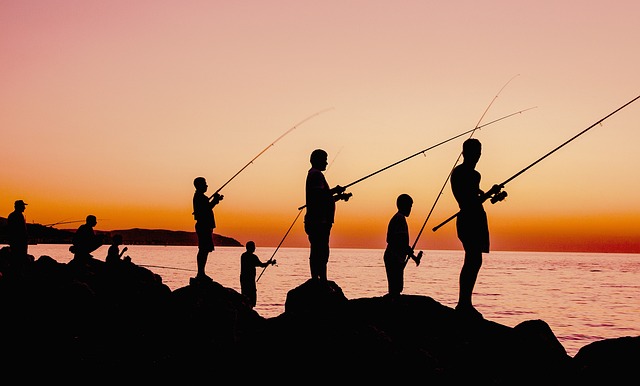In the sphere of athletic pursuits and pastime diversions, one might query the need for procuring a fishing license. The primary function of this paper transcends simple regulation. At its heart, the fishing permit aims to back efforts aimed at preserving our environment, ensuring aquatic creatures and their habitats are sustained for future progeny. The granting of such a license contributes generously towards funding vital wildlife and conservation projects. It empowers authorities to oversee fish populations effectively, offering devotees of angling an avenue to enjoy their hobby without depleting resources or upsetting fragile ecosystems.
For several individuals, the expense involved in applying for a fishing license could be discouraging. However, when one ponders over the advantages that accompany its acquisition, the cost seems relative and justified indeed. To put it in perspective – considering it as an investment rather than expenditure would make sense – like contributing towards Ohio’s rich fishing experiences offered by state programs focused on fish and wildlife resources longevity is worth every penny spent on acquiring an ohio fishing license; not only does it help protect local ecosystem but also preserves Ohio’s time-honored tradition of angling.
The Process of Obtaining a Fishing License
Embarking on the journey of procuring a fishing license generally entails certain, albeit pivotal steps. Initially, one must discern the specific type of license required, which is predominantly influenced by variables such as residency status, age bracket, and nominated fishing locale. Subsequent to this identification phase is gaining clarity about where and in what manner to obtain said license.
Predominantly speaking, licenses can be sourced from governmental wildlife departments operating within most jurisdictions alongside sanctioned retail points of sale or tangible outlets like angling shops.
For instance – suppose an aspiring fisherman asks: “What’s the cost for a fishing license in Ohio?” In scenarios like this one would find it useful to direct their online inquiries towards resources such as Ohio’s Department of Natural Resources Division of Wildlife webpage. Herein lies comprehensive information regarding licensing fees among other details – available round-the-clock at your convenience. License procurement options include online purchase platforms, authorized agents or via telephonic communication with Ohio DNR representatives.
Securing a fishing permit tends to follow a streamlined procedure encompassing digital or physical submission of meticulously detailed forms accompanied by payment covering relevant charges followed by subsequent verification executed by the department. It’s crucial not to overlook that procedures may demonstrate minor variations contingent upon region-specific directives.
Types of Fishing Licenses Available
Venturing into the labyrinth of available fishing licenses, it is clear that they are meticulously crafted to accommodate a range of user requirements. Broad groupings encompass residential, non-residential, lifetime and disability licenses. The finer nuances of these permits hinge on the fishing type – be it fresh or saltwater – along with the specific region or state in question. For example, some states offer unique licenses tailored for particular types of game fish while others provide one comprehensive license covering all species.
Shining a spotlight on Ohio specifically reveals intriguing regulations regarding age exemptions for fishing licenses. Here, those under 16 years of age are granted a free pass to cast their lines without financial worry about licensing costs. Similarly, seasoned citizens aged 66 or older who have called Ohio home for at least half a year qualify for complimentary fishing privileges too. This thoughtful provision extends benefits across both ends of the age scale ensuring enjoyment and accessibility for all.
Comparison of Resident and Non-Resident License Prices

As we plunge further into the financial facets, a noticeable discrepancy between the cost of fishing licenses for Ohio’s inhabitants and non-inhabitants becomes starkly apparent. Those who call Ohio their home seem to enjoy lower licensing fees, given their taxpayer status within the state’s borders. However, those visiting from outside must part with slightly heftier sums even though they are subject to identical angling regulations. This variance is not exclusive to Ohio but can be observed across all states as they each enforce alike pricing norms.
When considering exemptions associated with these fishing permits, it’s critical to keep in mind several details. To respond accurately ‘Who isn’t required a fishing license in Ohio?’, one must grasp fully the official stipulations laid down by Ohio’s Department of Natural Resources. Certain groups – such as individuals falling under or over certain age brackets or those holding particular disability allowances – may find themselves free from this obligation more often than not. A profound understanding of these laws and how they apply both to residents and visitors could prove advantageous in cutting down expenses while ensuring you remain on the right side of state-imposed fishing rules.
Now, let’s delve deeper into comparing the prices of resident and non-resident licenses.
- Resident Licenses: As a general rule, residents of Ohio enjoy lower licensing fees due to their taxpayer status within the state. The exact cost can vary depending on several factors such as age and disability allowances.
- Age Exemptions: In many cases, individuals falling under or over certain age brackets are exempt from needing a fishing license in Ohio.
- Disability Allowances: Those holding particular disability allowances may also find themselves free from this obligation.
- Non-Resident Licenses: Conversely, those visiting from outside must part with slightly heftier sums for their fishing licenses. This is despite them being subject to identical angling regulations as residents.
- No Exemptions based on Age or Disability: Unlike resident licenses, non-residents do not benefit from any exemptions based on age or disabilities.
It’s important to note that these pricing norms are not exclusive to Ohio but can be observed across all states. Each state enforces similar rules when it comes to the price differentiation between resident and non-resident fishing licenses.
In summary, understanding these laws and how they apply both to residents and visitors could prove advantageous in cutting down expenses while ensuring you remain compliant with state-imposed fishing rules. It’s always recommended that potential anglers familiarize themselves with these stipulations before planning their next fishing trip in order avoid any unforeseen issues or costs.
Breakdown of Fishing License Fees
The price tag attached to a fishing license swings widely, influenced by a smorgasbord of factors such as one’s age bracket, home territory, intended duration of use and the particular species of finned prey in question. To shed light on this mystery with some tangible figures: An Ohio resident who has reached adulthood might find themselves shelling out anything from $19 to an upper limit of $40 for their yearly permit. In comparison, Texans face a similar range for freshwater exploits but see the rate jump up to $63 when braving the saltwater.
For those only occasionally tempted by the lure or visitors just passing through, there exist temporary licenses which offer a more economical solution; indeed these are typically valid for mere days rather than months. There is also good news for younger enthusiasts, our respected elders and individuals dealing with disabilities – they can often avail discounted rates.
A query that echoes frequently among angler communities is “What financial burden will I bear if caught fishing without said license in Ohio?” It cannot be emphasized enough that abandoning legal obligations and venturing into waters unlicensed amounts to misdemeanor charges across most states. Those guilty could find themselves ensnared in hefty penalties’ net.
In terms of specifics within Ohio’s jurisdiction – fines meted out for unlicensed fishing hinge upon the count number associated with offender’s past violations but usually kick off at around $50 mark when it comes to first-time transgressors. Yet repeated defiance sees this figure spiraling upwards quickly.
As such it becomes paramount to stay ahead of local regulations’ curveball and secure all necessary permissions before casting your line into aquatic realms; ensuring not only legality but also peace of mind allowing you truly immerse yourself into joys offered by this leisurely pursuit.
Additional Costs Associated with Fishing Licenses
Beyond the customary charges for the fishing authorization, there may lurk additional financial obligations that novices and aficionados alike could face. These ancillary expenditures are typically tied to the specific genre of angling one aspires to undertake and the necessary equipment entailed therein. Whether it’s bait, tackle or specialized gear for diverse fish species; these hidden costs can substantially inflate the total expenditure.
Further, ownership or hire of a boat followed by its consequent upkeep costs for those partial to offshore or lake fishing may add another layer of expenses that must be contemplated.
The geographical positioning and temporal aspect also hold sway over these subsidiary costs. To illustrate this point, certain territories might necessitate permits for angling in particular aquatic zones or during specified times of year. Furthermore, if one harbors ambitions to cast lines across different states within U.S.A., multiple licenses might be obligatory thereby escalating travel and lodging bills for those planning on embarking on fishing expeditions.
Overstepping the basic licensing fees boundaries, these extra outlays demand consideration in order to gain a comprehensive grasp of what constitutes your final investment into this leisurely pursuit commonly known as ‘fishing’.
Benefits and Privileges of a Fishing License
Obtaining the official permit for fishing, often termed a ‘fishing license’ is not merely an act of compliance to local jurisdiction. Rather, it unfolds into a multitude of beneficial and privileged outcomes that stretch far past simple adherence to rules and regulations. The possession of this certificate illuminates one’s zeal towards preserving aquatic life forms, thereby bolstering endeavors related to conservation.
Intriguingly, the fiscal gains accrued from these fishing licenses are frequently redirected toward sustaining marine ecosystems; habitats teeming with diverse fish species. Consequently, securing such a license can be viewed as making a significant contribution towards nurturing environmental sustainability – indeed an investment worthy of any enthusiast’s consideration.
Beyond its eco-centric aspect lies another cluster of pragmatic benefits linked closely with owning this coveted document – the fishing license. For starters, being granted legal consent to cast lines in specified regions across state or country boundaries invariably amplifies the odds of reeling in successful catches.
What’s more? A fishing license may serve as your passport into enhancing your angling journey as it typically unlocks access to events centered around fishing practices, learning programs on relevant subjects and networking opportunities within local angler societies – essentially opening doors into a treasure trove brimming with knowledge and experiences set against the thrilling backdrop that is world-famous sport: Fishing.
FAQ
The essence of acquiring a fishing license lies in its role in safeguarding our aquatic biodiversity and fisheries. It provides funds for research and law enforcement efforts to uphold fishing regulations, contributing significantly to conservation initiatives.
This procedure is not uniform across all states but generally includes filling out an application form, remitting a certain fee, and occasionally undergoing either a conservation or fishing course. Most applications can be seamlessly concluded online or physically at specified locations.
A multitude of different types exist including daily, annual, and lifetime permits. Other specialized licenses cater specifically to seniors, veterans, disabled individuals as well as youthful anglers.
Prices for these licenses demonstrate considerable variation from one state to another with non-resident versions typically commanding higher fees compared to those granted residents.
License fees predominantly finance research endeavors and conservation projects while maintaining adherence to enforced regulations regarding legal angling practices. However this exact breakdown may differ based on specifics from each issuing state.
Yes indeed! Besides buying your actual permit additional expenditures might encompass charges like species-specific stamps fee; handling or registration costs; plus rentals for required equipment.



